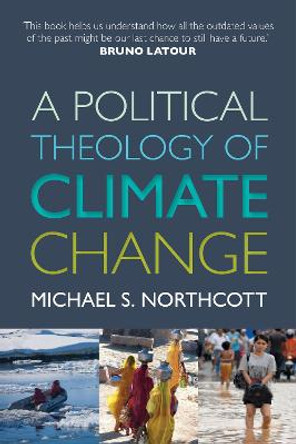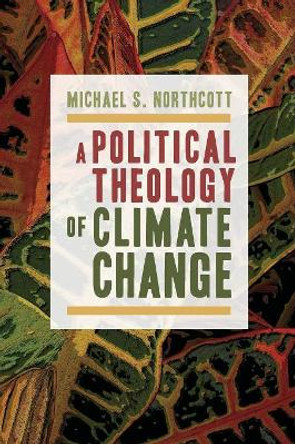Description
Theology and Climate Change examines Progressive Dominion Theology (PDT) as a primary cultural driver of anthropogenic climate change. PDT is a distinctive and Western form of Christian theology out of which the modern scientific revolution and technological modernity arises. Basic attitudes to nature, to instrumental power over nature, and to an understanding of humanity's relationship with nature are a function of the deep theological preconditions of Western modernity. Much of what we like about Western modernity is indebted to PDT at the same time that this tacit cultural theology is propelling us towards climate disaster. This text argues that the urgent need to change the fundamental operational assumptions of our way of life is now very hard for us to do, because secular modernity is now largely unaware of its tacit theological commitments.
Modern consumer society, including the global economy that supports this way of life, could not have the operational signatures it currently has without its distinctive theological origin and its ongoing submerged theological assumptions. Some forms of Christian theology are now acutely aware of this dynamic and are determined to change the modern life-world, from first assumptions up, in order to avert climate disaster. At the same time that other forms of Christian theology - aligned with pragmatic fossil fuel interests - advance climate change skepticism and overtly uphold PDT. Theology is, in fact, crucially integral with the politics of climate change, but this is not often understood in anything more than simplistic and polemically expedient ways in environmental and policy contexts. This text aims to dis-imbed climate change politics from polarized and unfruitful slinging-matches between conservatives and progressives of all or no religious commitments.
This fascinating volume is a must read for those with an interest in environmental policy concerns and in culturally embedded first-order belief commitments.
About the Author
Paul Tyson is a Senior Research Fellow at the Institute for Advanced Studies in the Humanities at the University of Queensland. His scholarship works across the sociology of knowledge and philosophical theology. He has particular interests in science and religion, and in the political implications of culturally embedded beliefs and practices. His recent books include Kierkegaard's Theological Sociology (2019), and Seven Brief Lessons on Magic (2019).
Reviews
"This is a truly valuable book. Dr Paul Tyson's Theology and Climate Change delves deeper into the heart of the matter than most treatments of the subject - not only by sketching the different rival theologies of nature at play, not only by pointing out how political these theologies are (be they secular or religious), but most importantly by putting the subject in a context often overlooked: that of the implicit ubiquity of theology as first philosophy. Dr Tyson highlights the philosophical underpinnings of developments in intellectual history, as now embedded in our very way of life, that are centralmost to the genuinely politically hard problems of adequately addressing our ecological crisis. This book should be illuminating and helpful to both Christians grappling with their own theologies of nature in our times, and to environmentalists of no Christian commitments who have never really considered how politically important a serious appreciation of the theological roots of the present crisis really is."
Dr Sotiris Mitralexis, University of Winchester
"I found this an engaging and engaged work that multiply illuminates the inseparability of theology and pressing questions of climate change. Paul Tyson offers us a deeply thoughtful and informative reflection on these questions, and at different levels. He does so in relation to old and new theological resources, as well as in relation to current discussions and contemporary controversies. It is written in a voice that will provoke thought in the non-specialist, as well as meeting exacting demands made by the more specialized. It is an impressive essay on the theological dimensions of ecology, in a manner that expands the voice of theology and insightfully includes ecological concerns within the amplitude of a greater mindfulness. Tyson's work offers us a balance of theological finesse and ecological acumen, with a presiding voice not devoid of salutary common sense. His impressively thoughtful voice is both accessible and penetrating. Warmly recommended."
William Desmond, David Cook Chair in Philosophy, Villanova University, USA, Thomas A.F. Kelly Visiting Chair in Philosophy, Maynooth University, Ireland, Professor of Philosophy Emeritus, Institute of Philosophy, KU Leuven, Belgium
"This is a truly valuable book. Dr Paul Tyson's Theology and Climate Change delves deeper into the heart of the matter than most treatments of the subject - not only by sketching the different rival theologies of nature at play, not only by pointing out how political these theologies are (be they secular or religious), but most importantly by putting the subject in a context often overlooked: that of the implicit ubiquity of theology as first philosophy. Dr Tyson highlights the philosophical underpinnings of developments in intellectual history, as now embedded in our very way of life, that are centralmost to the genuinely politically hard problems of adequately addressing our ecological crisis. This book should be illuminating and helpful to both Christians grappling with their own theologies of nature in our times, and to environmentalists of no Christian commitments who have never really considered how politically important a serious appreciation of the theological roots of the present crisis really is."
Dr Sotiris Mitralexis, University of Winchester
"I found this an engaging and engaged work that multiply illuminates the inseparability of theology and pressing questions of climate change. Paul Tyson offers us a deeply thoughtful and informative reflection on these questions, and at different levels. He does so in relation to old and new theological resources, as well as in relation to current discussions and contemporary controversies. It is written in a voice that will provoke thought in the non-specialist, as well as meeting exacting demands made by the more specialized. It is an impressive essay on the theological dimensions of ecology, in a manner that expands the voice of theology and insightfully includes ecological concerns within the amplitude of a greater mindfulness. Tyson's work offers us a balance of theological finesse and ecological acumen, with a presiding voice not devoid of salutary common sense. His impressively thoughtful voice is both accessible and penetrating. Warmly recommended."
William Desmond, David Cook Chair in Philosophy, Villanova University, USA, Thomas A.F. Kelly Visiting Chair in Philosophy, Maynooth University, Ireland, Professor of Philosophy Emeritus, Institute of Philosophy, KU Leuven, Belgium
"The human destruction of nature is the ultimate blasphemy and iconoclasm. It is our refusal of the theophanic itself. And yet perverse and heterodox theologies of creation which deny the theophanic are complicit in this unimaginable evil. Too often, they are endorsed by people who laughably imagine that they are 'conservatives'. All this and more is exposed in Paul Tyson's admirably clear and succinct new book. It can seriously help Christians to help save the Creation."
John Milbank, University of Nottingham
"In this engaging book Paul Tyson presents a penetrating analysis of the generative role of Western science and Christian theology in promoting the idea of progress as dominion over nature. In a time of increased political ferment between liberals and conservatives he aims to reach across the ideological divide by remapping their shared roots in Western Christian thought with the help of a remarkable range of reading from revisionist histories of science and religion to Celtic, Evangelical and Orthodox theologies. This all makes for a concise and stimulating read even for those familiar with the terrain."
Professor Michael Northcott, Universitas Gadja Madah, Indonesia
Book Information
ISBN 9780367565367
Author Paul Tyson
Format Hardback
Page Count 150
Imprint Routledge
Publisher Taylor & Francis Ltd
Weight(grams) 281g





